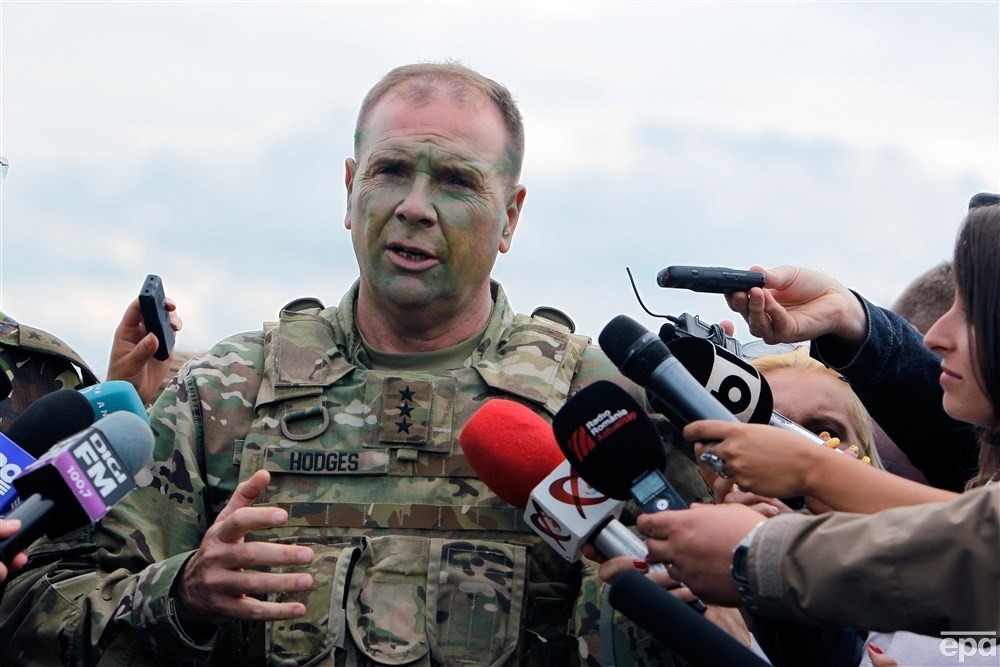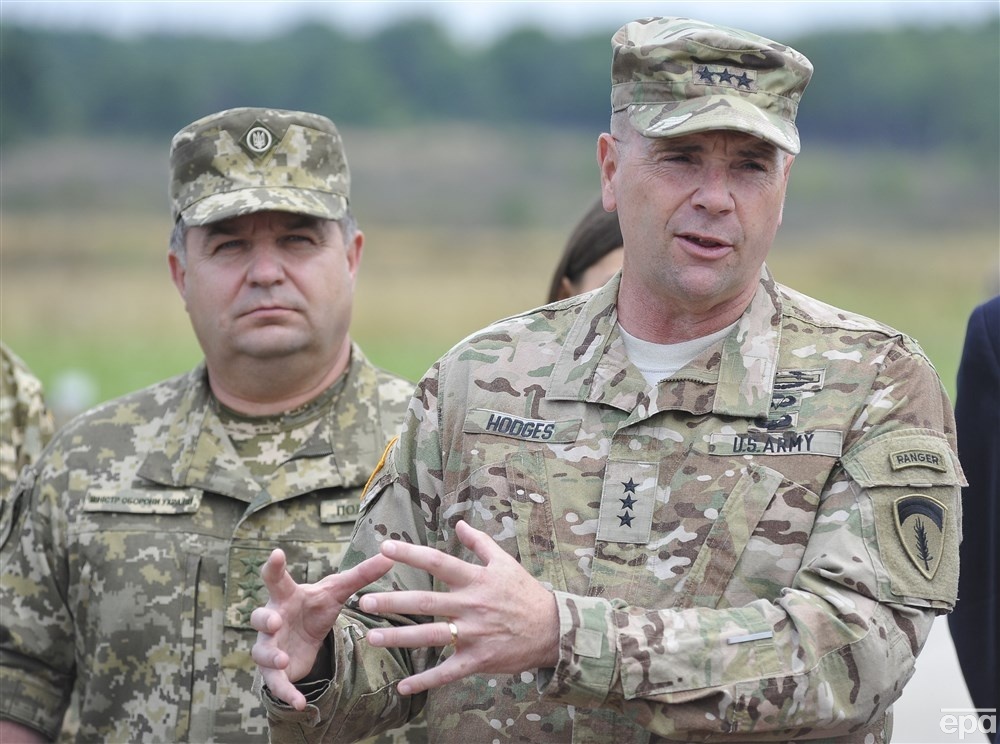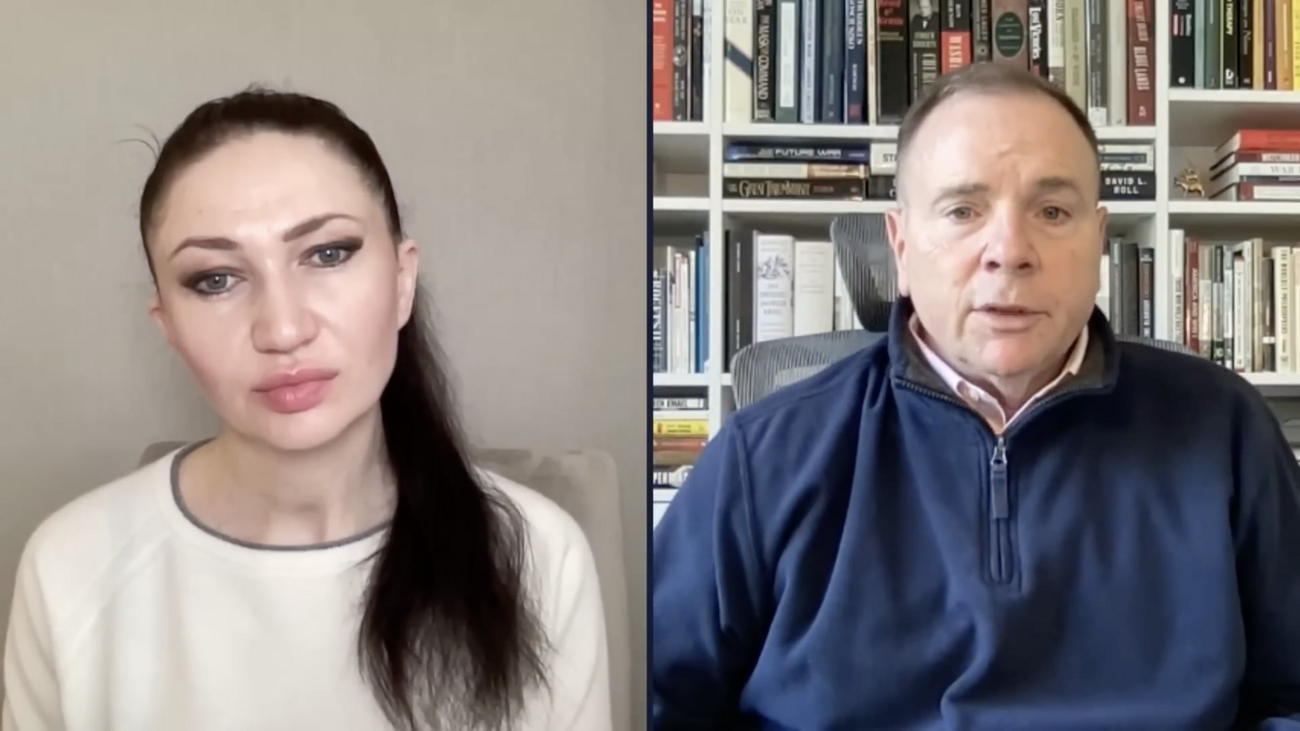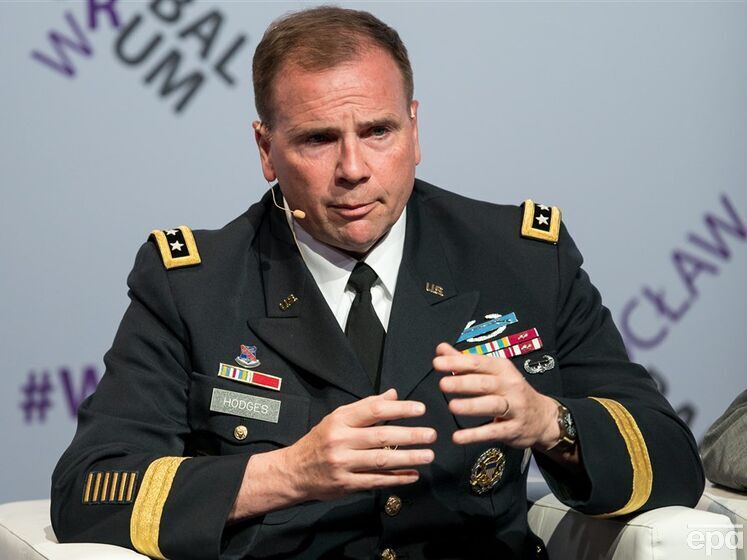I was sure that the Ukrainian soldiers would fight well. What I did not expect was such a strong resistance from the Ukrainian civilians. I was really impressed.
– Good evening, general.
– Good evening.
– It's a pleasure to see you. Two weeks before Russia's large-scale invasion, you participated in our YouTube show Gordon. At that time, you said that Russia would not be able to take over Kyiv in three or four days. Although many in the West thought otherwise. Why did you say that?
– I knew that, first of all, because I had been to Kyiv before the war. I saw that it was a huge city with a huge number of large buildings and a complex urban terrain. It was mathematically impossible to capture Kyiv in three days. It made no sense. Besides, I was sure that the Ukrainian soldiers would fight well. What I didn't expect was such a strong resistance from Ukrainian civilians. I was really impressed.
– The New York Times reported on the largest leak of classified documents from the Pentagon, including those related to the Ukrainian counteroffensive. How critical is the leak? And does it mean that there is a Russian spy in the Pentagon?
– The leak was certainly damaging. Although much of this information has already been published before. I am sure that the Ukrainian General Staff was aware or warned about this danger. And they will take all the necessary steps. The leak was damaging in the sense that there was a loss of confidence in the intelligence exchange. And that's unfortunate. I'm sure the Pentagon investigation that's going on will eventually lead us to the source of the leak. I don't know for sure, but I suspect that it probably happened because the information was improperly processed. In other words, there was a violation of discipline. Someone without certain access got the classified information and passed it on. I don't know if there is a Russian spy in the Pentagon, but there is certainly no doubt that Russia, China and other enemies or potential enemies of the United States are always trying to get this information. That's why it's so important that we all get training and practice our discipline in handling classified information to prevent this from happening again. I think that's what an internal investigation will show: someone was careless or violated protocols about how to handle these documents.
 Ben Hodges at Saber Guardian military training exercises in Romania, 2017. Photo: EPA
Ben Hodges at Saber Guardian military training exercises in Romania, 2017. Photo: EPA
– After a visit to China, Emmanuel Macron said that Europe should reduce its dependence on the U.S. and avoid being drawn into a confrontation between China and the U.S. over Taiwan. What does this mean? Is China, just like Putin, dreaming of destroying the unity of Europe and the U.S. and trying to do so at Macron's hands?
– The French president's speech was indeed embarrassing. He tried to somehow overlook the fact that China is a complete autocracy and a murderous regime, that it is destroying all the values that President Macron himself claims to uphold. His idea that a choice must be made between China and the United States is, of course, laughable. The Chinese have shown how little respect they have for Mr. Macron by launching a big operation to [drill] surrounding Taiwan immediately after his departure. This tells us all about Macron's influence over China. And his criticism that Europe being highly dependent on the United States.... This is, after all, the decision of European countries. If they are not willing to invest enough in their own defense, then of course they will depend on the United States. One interesting thing: The French under Macron, when they deployed troops to Mali, were totally dependent on American airlift, logistics and intelligence. So if he wants to reduce France's dependence on the U.S., please let him start doing his own thing. I still think that most European leaders and countries understand that it's not just a matter of dependence on the United States. The United States is just as dependent on Europe. We are allies, we depend on each other. All of our best and most reliable allies are from Europe, and also Canada and Australia. The United States needs the access that we now have in Europe. So I think President Macron will regret or take back his useless comment a little later.
– China's recent actions and statements have led many experts to say that the threat of World War III is more real than ever. And it would start between the two nuclear superpowers – the United States and China – over Taiwan. How realistic is this?
– Of course it is possible. By the signals we hear from Beijing about Taiwan, about their claim to the waters of the South China Sea, which no one in the world recognizes. All their actions indicate that China is on its way to having a conflict with the West. But I'm not sure that's what they really want. Obviously, China's economy depends on a proper trade relationship with the West.
– With Europe and the United States.
– Exactly. So I think what's happening in Ukraine is actually going to help decide whether or not there's going to be a conflict with China. The Chinese are looking at whether the West is really willing to come together and help Ukraine fight for common values: sovereignty, human rights, an internationally based order of trade, international law. If we are not prepared to help Ukraine defend these values, then China will draw conclusions and say, "The West is probably not going to do anything to defend sovereignty or international law in the Pacific".
I can't imagine any scenario in which we would intentionally eliminate the president of Russia– British General Richard Dannatt thinks that Putin will be killed in a Julius Caesar scenario. He sees Gerasimov, head of the Russian General Staff, in the role of Brutus. Dannat is confident that this scenario could work in case of a successful Ukrainian counterattack. How likely is a coup against Putin? And who might lead it?
– I am not aware of such insider details. But I find it interesting that there is such public hatred between Prigozhin, Shoigu, Gerasimov, and Kadyrov. All these people clearly and openly hate each other. And this is good for Ukraine and for all of us. As long as they are fighting each other, they are unable to develop a coherent strategy for their illegal and aggressive war in Ukraine. I would not be surprised if there are a lot of dissatisfied people in the Kremlin and in Putin's inner circle, as well as a lot of oligarchs who are losing a lot of money and the ability to travel and do business around the world. Of course, this war is a disaster for Russia. I think this is why President Putin has such a strong internal security apparatus: he is trying to protect himself and his regime.
– One often hears that the U.S. knows where Putin is physically at any given time, and that there are types of weapons that can penetrate any bunker. Is this true?
– I honestly don't know if we have that capability. As you know, the location of the American president is known to the world all the time. There's no mystery about it. But, look, the United States has no interest in changing Putin's regime. Everything depends on the Russian people: how long they [the Russians] are ready to tolerate another dictator and authoritarian regime. This is history: Russia's leaders treat the Russians as badly as they treat their neighbors. So what happens is up to them. I can't imagine any scenario in which we would deliberately eliminate the Russian president.
– What kind of finale awaits the war criminal Putin?
– I hope that the Russian people themselves will hand Putin over to the International Criminal Court in The Hague to be convicted of murdering thousands of innocent Ukrainians and deporting thousands of Ukrainian children. The end for Putin should be in a courtroom. The United States should support the International Criminal Court more. And I hope the U.S. government decides to ratify the Rome Statute and become an active participant.
– Ukraine's victory for Ukrainians is the return of all territories, including Crimea and Donbas, it [the victory] is a security guarantee for Ukraine that this will not happen again. This is possible if Ukraine becomes a NATO member. And what is a Ukrainian victory for the United States and the West?
– I would like my government to clearly state "we need a victory for Ukraine," that U.S. policy is a victory for Ukraine as defined by President Zelenskyy: the full restoration of Ukraine's territorial integrity, the return of all deported Ukrainians, the responsibility of the Russians for all the war crimes. And then some kind of security guarantees, including eventual NATO entry. This is the picture I would like to see. Support for such an end to the war is quite large, but not yet unified. And so the priority right now is to make sure that Ukraine wins over Russia. That's the most important part. We need to help Ukraine with continuous efforts with modernizing its defense. We need Ukraine to be armed to the teeth, like South Korea, so that it has the ability to deter Russia from attacking again. I expect some kind of agreement or arrangement between the United States along with perhaps some other countries and Ukraine to improve Ukraine's security until it becomes a NATO member.
 Hodges and then-Ukrainian Defense Minister Stepan Poltorak (left) at a military exercise at the Yavoriv training ground, 2015. Photo: EPA
Hodges and then-Ukrainian Defense Minister Stepan Poltorak (left) at a military exercise at the Yavoriv training ground, 2015. Photo: EPA
– What kind of agreement could this be?
– I do not know yet what my government is willing to provide or what Ukraine would find acceptable. But obviously it has to be something much more significant and tangible than the so-called Budapest Memorandum, which was an absolute failure by the United States, Britain, and Russia. I could envision more drills and maybe even a rotational presence of our troops in Ukraine. That would be good for everyone. When I was the commander of the U.S. Army in Europe, U.S. and Canadian troops were constantly at the training center at the Yavoriv military training ground. We can replicate that kind of action. But it should also be part of the United States and NATO strategy for the Black Sea region. Ukraine is not an island. We need to think of Ukraine in terms of where it is on the map. We need a clear strategy in which we work closely with our Turkish, Romanian, and Bulgarian allies to get more naval presence in the Black Sea region rather than giving the region to Russia to do whatever it wants.
– I have been saying for a long time that not only Ukraine but the whole civilized world will feel safe only when Russia is deprived of its nuclear weapons. How do you see the scenario of depriving Russia of nuclear weapons?
– I still don't think we'll ever take nuclear weapons away from Russia. As NATO Secretary General Jens Stoltenberg said, it would be great if there were no nuclear weapons in the world at all. But I'm afraid that's impossible. The presence of a Russian nuclear constraint is simply necessary. If Russia thinks about using nuclear weapons, we have an answer: our own nuclear capabilities, which could successfully and completely stop Russia. And I am sure that none of the countries that now have nuclear weapons, or are close to having them, would be willing to give them up. I mean, they see the United States hesitating just because Russia is threatening to use nuclear weapons in or near Ukraine. So other countries also want this powerful capability. We have to assume that Russia will always have nuclear weapons. We need Russia's deterrence first and foremost, and we need an arms control agreement where there is complete transparency and you can see what everyone has. That's what we had during the Cold War. We had reasonable arms control agreements. But that requires a leader in the Kremlin with whom we could communicate properly. Obviously, that's not the case now.
The Ukrainian forces can destroy every Russian within 200 km of Bakhmut, but this will not change the strategic situation of the war. The liberation of Crimea will change everything
– What should the West do with defeated Russia? Will Russia disintegrate or remain united? And who will come to power in Russia? What names can you name?
– Whoever comes after Putin, it can't get any worse. Sometimes we hear people say that the next guy might be even worse. I highly doubt that. He might be the same, but I don't think anyone can outdo Putin in terms of lives lost and destruction. Since Russia is made up of over 80 different republics, territories, and countries that have created a federation out of Russia, the possibility of disintegration is very real. There will be some republics that will want to stay tied to Russia, and there will always be Russia itself, but on the other hand, there are Chechnya and other republics that do not want to stay with Russia and will be the first to seize the chance after it is defeated. They will seize the opportunity to pull out. And we have to be ready for that. We have to think about the consequences of a massive influx of refugees, of controlling nuclear weapons and energy infrastructure. The U.S. or other countries should not try to influence the collapse of Russia. But we should definitely prepare for the consequences.
– You recently said that Ukraine needs to liberate Crimea first. Some experts even say that if Crimea is liberated, there will be such a panic in Russia that Russian occupiers will simply flee from the occupied territories of Donbas.
– Crimea is the decisive point of this war. Ukrainian troops can destroy every Russian within 200 km of Bakhmut, but this will not change the strategic situation of the war. The liberation of Crimea will change everything. Ukraine will never be completely safe as long as Russian forces occupy Crimea and can use it as a launching pad for the next war. In addition, it is unrealistic for Ukraine to rebuild its economy as long as Russia occupies Crimea and is able to block deliveries across the Sea of Azov or from Odesa and Mykolaiv. It is clear to everyone that Crimea must be liberated. If the U.S. and other countries would provide Ukraine with everything it needs to do so, in particular long-range precision weapons that would make Crimea unbearable for Russian troops... For example, a direct hit on the navy in Sevastopol, on the airbase in Saky, on the logistic center in Dzhankoy and other facilities... You hit them with high-precision weapons – and it becomes very, very difficult for Russian troops to stay in Crimea. This move is necessary, but more long-range, high-precision weapons will be needed. Once that is done, it will be time to hit the Crimean bridge again and isolate Crimea. This scenario is extremely realistic and could actually happen as early as the end of this summer. But the key to it all is the West's provision of long-range weapons to Ukraine.
 Screenshot: Alesya Batzman / YouTube
Screenshot: Alesya Batzman / YouTube
– For how long does Russia have the ability to fight the war?
– As long as they have bodies that Putin is willing to throw into the meat grinder, Russia is able to keep fighting. What I never understood and still don't understand is why the Russian people are willing to put up with this. At some point they have to realize that they have lost a lot of the people, lost plenty of resources, their economy is in ruins... Only then will it all stop. But as long as Putin feels he cannot be defeated, he will continue to waste lives and resources to achieve his goal.
– What countries can supply weapons to Putin?
– So far, Iran is the only country that openly provides weapons to Russia. What's funny: why does Russia have to import drones from Iran? Is Russia's defense industry so bad that they cannot produce these relatively simple drones? This is an interesting thing to pay attention to. North Korea has talked about supplying ammunition, but I'm not sure if they would go for it or how much of a difference it would make in the overall situation. China is probably trying to provide some of the components that Russia needs to produce high-precision weapons. But on the other hand, the Chinese are very wary of U.S. sanctions. And so they should be careful. I don't even know who else besides Iran is able to significantly provide Russia with weapons or ammunition.
– When will the war end? When will Ukraine win?
– Victory could come this year. It largely depends on the U.S. and some other Western countries firmly stating their desire for Ukraine to finally win. If we make a political decision, then the war will be over by the end of the year if we provide Ukraine with everything it needs. There will be no more excuses, no more half-measures. We will take it and do it. And I believe in that possibility. But if we don't, the war will probably continue into next year.
– General Hodges, thank you for this interview. Thank you for your time. And glory to Ukraine.
– Glory to the heroes. Thank you for this opportunity.


 +2 Kyiv
+2 Kyiv


